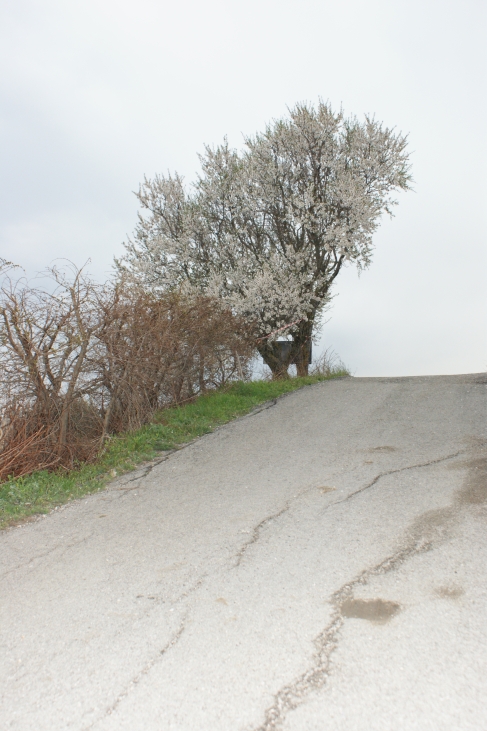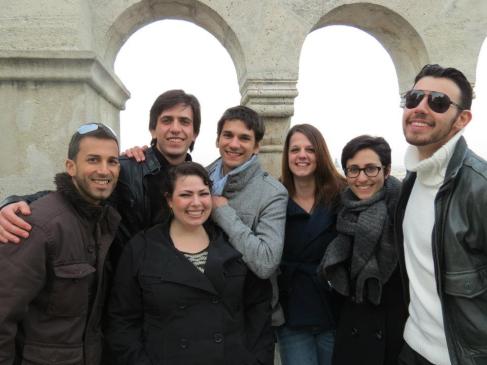Saturday afternoon I went out for a walk in the countryside. I took my camera and I started to wander around to find something that could really symbolize my educational process. I walked and walked despite the fact that it was getting darker and darker: the wind began to blow shaking the trees laden with flowers; big fat clouds were gathering drawing a grey blanket over my head; only a few birds were singing: there was thunder in the air. Rain drops began to fall; I lengthened my stride to find a shelter, when suddenly I found what I was looking for. At the very end of a deserted steep country road surrounded by old shrubs, a beautiful almond tree was standing alone. The view wasn’t really breathtaking, but I was interested in the “attitude” of that tree: it seemed that solitary tree was looking down the road. I was captured by that view because I understood that was the metaphor of how my life has changed in the past three years. Three years ago, when I earned my high school diploma I was at the beginning of that road: I was sure I wanted to leave my small narrow-minded village and the only way to reach that goal was applying for a university that was at least 400 km away from the place I grew up. I chose to move to Rome and then my new life began. Even though I was thrilled, I soon understood that a huge change like that is not easy to manage: moving from a small village nestled in the country into a big city like Rome is shocking at first. I had to learn how to live alone, how to manage a house and, at the same time, I had to study. The road was long and uphill, bumpy at times. I admit that sometimes I thought of giving up and going back to the comfortable life I used to live in my village. Yet, I found reasons to go ahead and then, before I realized that three years had passed, I found myself at the top of the hill. Last November, when I graduated, I understood that I reached my goal: the BA I earned in an Italian university marked the end of the long journey along that steep road.
At the very end of a deserted steep country road surrounded by old shrubs, a beautiful almond tree was standing alone. The view wasn’t really breathtaking, but I was interested in the “attitude” of that tree: it seemed that solitary tree was looking down the road. I was captured by that view because I understood that was the metaphor of how my life has changed in the past three years. Three years ago, when I earned my high school diploma I was at the beginning of that road: I was sure I wanted to leave my small narrow-minded village and the only way to reach that goal was applying for a university that was at least 400 km away from the place I grew up. I chose to move to Rome and then my new life began. Even though I was thrilled, I soon understood that a huge change like that is not easy to manage: moving from a small village nestled in the country into a big city like Rome is shocking at first. I had to learn how to live alone, how to manage a house and, at the same time, I had to study. The road was long and uphill, bumpy at times. I admit that sometimes I thought of giving up and going back to the comfortable life I used to live in my village. Yet, I found reasons to go ahead and then, before I realized that three years had passed, I found myself at the top of the hill. Last November, when I graduated, I understood that I reached my goal: the BA I earned in an Italian university marked the end of the long journey along that steep road.
On commencement day I was as happy and proud as I could be. Yet, I was also aware of the difficulties I faced to reach the top of the hill. I was like that solitary tree and my degree was like an almond: it was the fruit of my labor. Nothing other than an almond could have better symbolized it: only after cracking its hard shell one can really taste its sweet and all encompassing taste. Nonetheless, I knew that a new uphill road was already unfolding before my eyes, but I also needed to pause, push the rewind button and focus on what I had done so far. I felt like the tree I was staring that Saturday: once at the top of the hill, before starting something new, one needs to be aware of where he comes from. I should always keep in mind the whole path towards the top of the hill, because part of what I achieved and traits of my personality have been shaped by the environment and the education I experienced in the place where I grew up. That is why, like the almond tree, I need to look back at the uphill road and, even if I don’t like it very much, I have to go back to the village where I was born from time to time.
Even if I have to face thousands of uphill roads, there is no way of turning back to my old life; my future is away from Pietragalla. Even so, no matter where I go, I should never forget where I come from.





